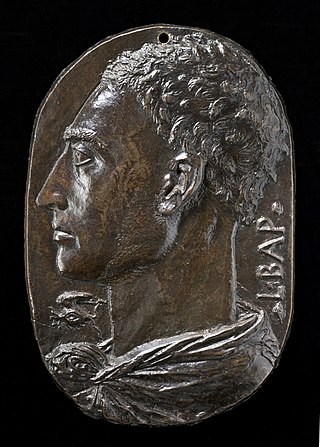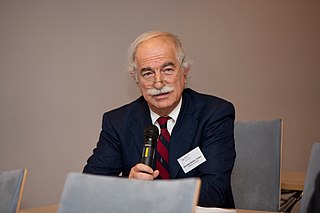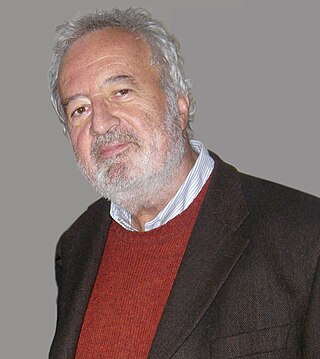Cosimo Perrotta (born July 9, 1942) is an Italian professor of economic history at the University of Salento and author of the book Consumption as an Investment. Perrotta was born in Squinzano, Italy. [1]
Cosimo Perrotta (born July 9, 1942) is an Italian professor of economic history at the University of Salento and author of the book Consumption as an Investment. Perrotta was born in Squinzano, Italy. [1]

Leon Battista Alberti was an Italian Renaissance humanist author, artist, architect, poet, priest, linguist, philosopher, and cryptographer; he epitomised the nature of those identified now as polymaths. He is considered the founder of Western cryptography, a claim he shares with Johannes Trithemius.

Year 1060 (MLX) was a leap year starting on Saturday of the Julian calendar.

The University of Florence is an Italian public research university located in Florence, Italy. It comprises 12 schools and has around 50,000 students enrolled.

Scipione Ammirato was an Italian author, philosopher and historian who lived during the Renaissance. He is regarded as an important figure in the history of political thought.

Luigi Numa Lorenzo Einaudi was an Italian politician and economist. He served as the president of Italy from 1948 to 1955 and is considered one of the founding fathers of the Italian Republic.
Mario Liverani, is an Italian historian and Professor of Ancient Near East History at the University of Rome La Sapienza. He is a member of many institutions, such as the American Oriental Society, Accademia delle Scienze di Torino, and doctor Honoris Causa of the University of Copenhagen and the Autonomous University of Madrid.

Luigi Zoja is an Italian psychoanalyst and writer. He took a degree in economics and did research in sociology during the late 1960s. Soon thereafter he studied at the C. G. Jung Institute in Zurich. After taking his diploma, Zoja returned to Zurich to work at a clinic for several years. He maintains a private practice in Milan. He also practiced for two years in New York City, during a period that bracketed the terrorist attacks on New York and Washington, D. C. He has taught regularly at the Zurich Jung Institute, and also on occasion at the Universities of Palermo and Insubria. From 1984 to 1993, Zoja was president of CIPA, and from 1998 to 2001 was president of the IAAP. Later he chaired the IAAP's International Ethics Committee. His essays and books have appeared in 14 languages.

Demographic economics or population economics is the application of economic analysis to demography, the study of human populations, including size, growth, density, distribution, and vital statistics.

Ernesto Screpanti is a professor of Political Economy who worked in various universities, like Trento, Florence, Trieste, Parma, New York, Rio de Janeiro, Siena. He did research in the “rethinking Marxism” scientific programme, in the attempt to update Marxist analysis by bringing it in line with the reality of contemporary capitalism, on the one hand, and to liberate Marxism from any residue of Hegelian metaphysics, Kantian ethics and economic determinism, on the other.
Elio Lo Cascio is an Italian historian and teacher of Roman history at the Sapienza University of Rome. Lo Cascio's main research interests are the institutional, administrative, social and economic history of Ancient Rome from the Republic to the Late Empire, and Roman population history.
Francesco Libetta is an Italian pianist, composer and conductor.

Franco Archibugi was an Italian scholar in political, economic and social sciences, university professor in economic policy and spatial planning. He largely operated in Italy and in international governmental agencies; including in the field of economic development, social welfare and cooperation policy. Archibugi was the author of several works in planning theory and methodology, and was among the theorists and promoters of a new unitary discipline of planning – the “Planology” – aimed at creating a bridge between the theoretical scientific progress in economics and other social sciences with the actual political and administrative efficiency and management. After retiring from academia, he was still an active researcher as President of the Planning Studies Centre. He died in Rome in November 2020 at the age of 94.

Giovanni Andrea Cornia was an Italian development economist. He was professor of economics, department of economics and management, at the University of Florence. He had previously been the director of the Regional Institute of Economic Planning of Tuscany, the United Nations University World Institute for Development Economics Research (UNU-WIDER), in Helsinki, and the Economic and Policy Research Program, UNICEF Office of Research-Innocenti, in Florence. He was formerly also chief economist, UNICEF, New York. His main areas of professional interest were income and asset inequality, poverty, growth, child well-being, human development and mortality crises, transition economics, and institutional economics. He was author of over a dozen books and dozens of articles, reports and working papers on practical development economics issues in individual countries, regions and globally. Born on 9 April 1947, he died in July 2024, at the age of 77.

Costantino Bresciani-Turroni was an Italian economist and statistician. He was the last internationally known representative of Italy’s classical school of economics, which flourished in the early part of the century and continued to exert its influence between the world wars.

Fernando Vianello was an Italian economist and academic. Together with Michele Salvati, Sebastiano Brusco, Andrea Ginzburg and Salvatore Biasco, he founded the Faculty of Economics of the University of Modena and Reggio Emilia.
Riccardo Realfonzo is a well-known post-Keynesian economist.

Cosimo De Giorgi or Arcangelo Cosimo De Giorgi was an Italian scientist.
Carl Levy is professor of politics at Goldsmiths College, University of London. He is a specialist in the history of modern Italy and the theory and history of anarchism.
The following is a timeline of the history of the city of Ferrara in the Emilia-Romagna region of Italy.